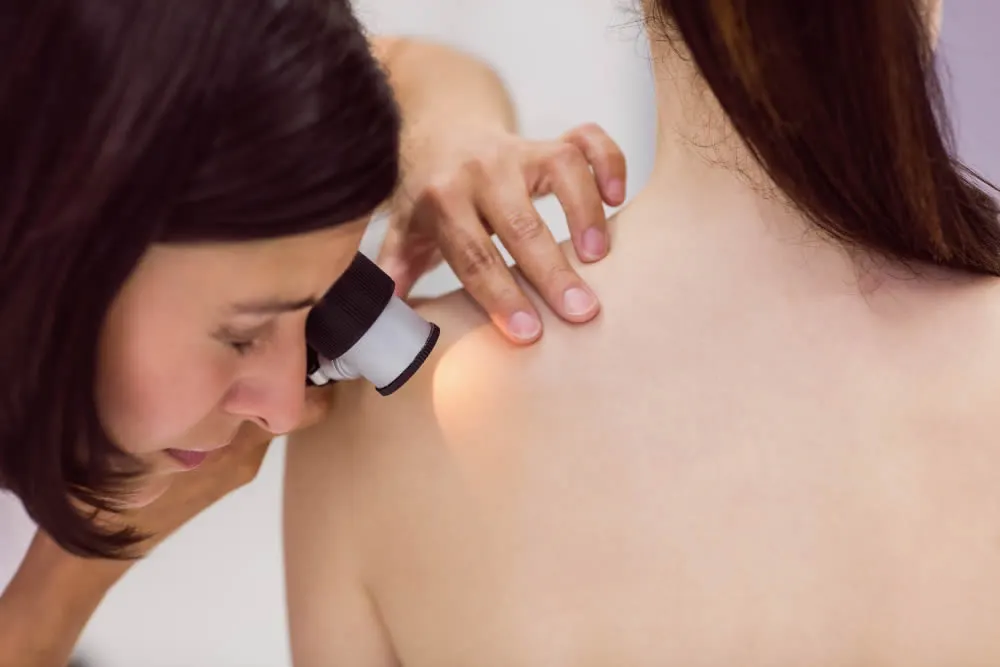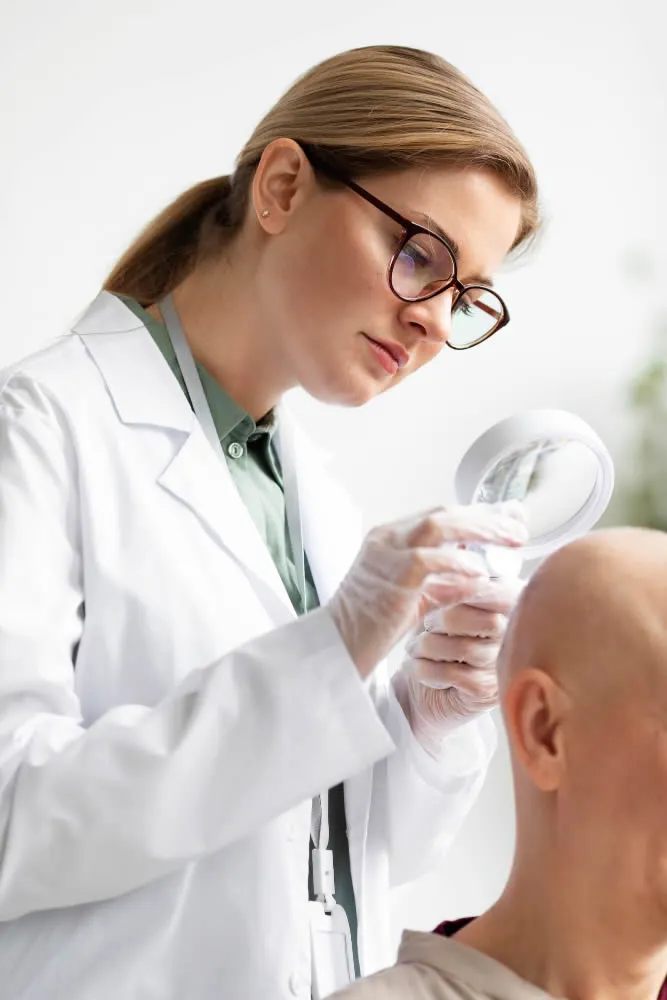What is Basal Cell Carcinoma?
Basal Cell Carcinoma (BCC) is a type of skin cancer that originates in the basal cells, which are responsible for producing new skin cells. BCC is most commonly found on areas of the skin that are frequently exposed to the sun, such as the face, neck, and hands. It usually grows slowly and rarely spreads to other parts of the body. However, early detection and treatment are important to prevent potential complications.

How does Basal Cell Carcinoma appear?
Basal Cell Carcinoma (BCC) often manifests with distinct visual characteristics, such as the appearance of a pearly or translucent bump on the skin. This type of skin cancer can also take on other forms, including a pinkish patch, an area resembling a scar, or a persistent sore that fails to heal.
Additionally, BCC-affected regions might exhibit a noticeable shine, present visible blood vessels, or even develop a central depression. While BCC’s appearance can vary widely, it’s imperative to remain vigilant and proactive.
If you notice any unusual or persistent changes in your skin, seeking the guidance of a dermatologist is crucial to ensure timely diagnosis and appropriate management.
Risk factors for Basal Cell Carcinoma
The leading cause of skin cancer, including basal cell carcinoma, stems from prolonged exposure to the sun’s UV radiation or the utilization of commercial tanning beds. Individuals residing in sunny regions or higher altitudes inherently encounter heightened UV exposure.
In addition, the following factors may also contribute to the risk:
- Fair Skin: People with fair skin possess reduced natural protection against UV radiation.
- Blond or Red Hair: Light hair colors are often associated with increased susceptibility to UV damage.
- Blue or Green Eyes: Eye color can impact sensitivity to UV radiation.
- Family History of Skin Cancer: A genetic predisposition to skin cancer elevates the risk.
- Weakened Immune System: Certain medical conditions and medications can compromise the immune system’s defense against cancer.
- Received Radiation Therapy: Previous radiation treatments can heighten the risk.
- Exposure to Harmful Substances: Contact with coal tar, pitch, creosote, or arsenic can contribute to susceptibility.
- Age: While basal cell carcinoma typically develops over many years, cases are emerging in younger individuals, including those in their 20s and 30s.
Diagnosis and treatment options for Basal Cell Carcinoma
Diagnosing basal cell carcinoma (BCC) entails a comprehensive skin assessment by a skilled dermatologist. When BCC is suspected, a definitive diagnosis might involve a skin biopsy, a procedure designed to confirm the presence of cancerous cells.
Treatment strategies for basal cell carcinoma vary based on factors such as the carcinoma’s size, location, and extent. Various effective approaches are available, each customized to fit the individual’s circumstances.
These treatment options encompass:
- Surgical Excision: The removal of the carcinoma and a margin of healthy tissue to ensure complete eradication.
- Mohs Micrographic Surgery: A meticulous procedure that excises cancer layer by layer while conserving healthy tissue, ideal for complex cases and delicate areas.
- Cryotherapy: The application of extreme cold to freeze and eliminate cancerous cells.
- Topical Treatments: Medications in creams or gels that target and destroy cancerous cells on the skin’s surface.
- Radiation Therapy: The controlled application of radiation to target and eradicate cancer cells.
The choice of treatment modality is precisely tailored to each individual’s unique circumstances, ensuring optimal outcomes in managing basal cell carcinoma.
Precaution against Basal Cell Carcinoma
The most effective measure to lower your risk of skin cancer, including Basal Cell Carcinoma, is to minimize direct sun exposure and avoid tanning beds. When venturing outdoors, adopting protective practices becomes paramount.
Protective Attire: Wear protective clothing, wide-brimmed hats, and sunglasses, and apply sunscreen with an SPF of 30 or higher. Opt for broad-spectrum sunscreen and reapply every two hours, especially after swimming or sweating.
Additional Guidelines:
- Seek Appropriate Shade: During the sun’s peak hours (10 am to 4 pm), seek shade whenever possible. If your shadow is shorter than your height, find shelter.
- Children’s Protection: Safeguard children from sun exposure by utilizing shade, clothing, and sunscreen.
- Caution Around Reflective Surfaces: Water, snow, and sand reflect sun rays, intensifying exposure. Be extra cautious to avoid the increased risk of sunburn.
- Vitamin D Intake: Obtain vitamin D from a balanced diet instead of seeking sunlight exposure.
- Avoid Tanning Beds Avoidance: Stay clear of tanning beds. Opt for sunless self-tanning products for a tan look.
- Regular Self-Examination: On your birthday, inspect your skin thoroughly and notify your dermatologist about any new, changing, or irregular moles or growths.

FAQs about Basal Cell Carcinoma
Are there any long-term side effects of radiation therapy for BCC?
In most cases, radiation therapy for basal cell carcinoma has minimal long-term side effects. However, discussing potential risks and benefits with your healthcare provider is essential to making an informed decision.
Can basal cell carcinoma occur in areas not exposed to the sun?
Yes, while sun exposure is a primary factor, basal cell carcinoma can develop in areas with limited sun exposure. Genetics and other risk factors can contribute to its occurrence in less sun-exposed regions.
Are There Any New Advances in Basal Cell Carcinoma Treatment?
Yes, research continues to improve treatment options. Immunotherapy and targeted therapies are emerging as effective options for advanced or hard-to-treat cases, offering new hope for patients.
Are There Any Foods or Supplements That Help Prevent Basal Cell Carcinoma?
Some studies suggest that foods rich in antioxidants, such as fruits and vegetables, may help protect against skin damage from UV radiation. However, these should complement, not replace, sun protection measures.
Is there a dermatologist near me in Miami Beach that offers treatment for Basal Cell Carcinoma?
Yes. At our Miami Beach dermatology office we offer treatment for Basal Cell Carcinoma to patients from Miami Beach and the surrounding area. Contact our office today to schedule an appointment.

